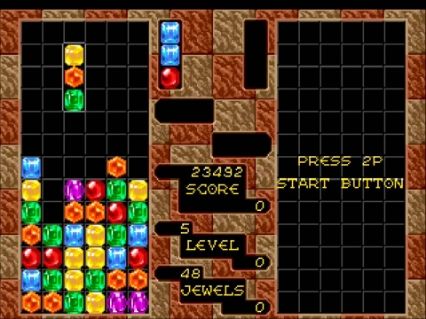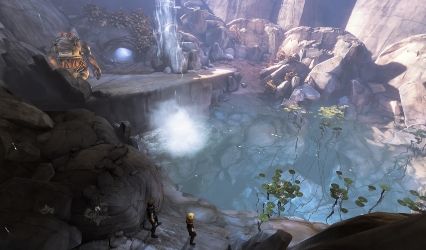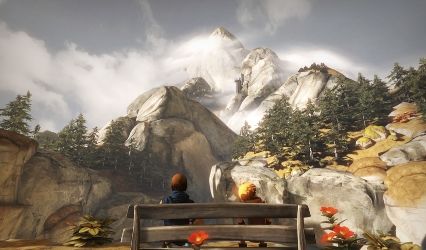- Drop your jaw in disbelief as Luke reveals the biggest Far Cry 3 fake spoiler of all time!
- Become confused as you attempt to figure out who is Stephen and who is Bryan!
- Feel bad for Seán who gets kicked off the Skype call because of faulty opinions!
This discussion may revolve around bad guys, but the episode sure isn’t… um… bad. Look, let’s just forget the clever transitions and skip to the bit with the audio player!
The opening and ending music is sonik metro by analoq, thanks to OC ReMix. Stephen did the editing as he tends to do.
]]>
- Format: PC, Vita/PSN (version reviewed)
- Unleashed: Out Now
- Publisher: Twisted Tree
- Developer: Ed Key and David Kanaga
- Players: 1
- Site: http://www.visitproteus.com/
Independently developed videogames with an artistic streak are like snowflakes: they’re lovely and unique but there sure are a lot of them. Originally released for the PC in early 2013 and now launching on the PSN and Vita, Proteus is one such indie game that goes way out on a limb, offering players a living piece of pixel art to explore without any objectives or story to speak of. Comparisons can be made to a handful of other titles– the procedurally generated landscape of Minecraft and Journey’s spiritual quest come to mind– but Proteus is far more ethereal. If poking around inside a moving painting sounds intriguing to you, this might be your thing; if it sounds dull and rather pointless, your princess undoubtedly resides in another castle. If it sounds like a little of both… well, you’re probably right.
Zero instruction is administered at the outset of Proteus, and that’s for the best; after all, you’re essentially relegated to strolling about and looking at things. A three-dimensional world built up of two-dimensional sprites unfolds through a first-person perspective, creating a pastel world always in motion. The hills are indeed alive with the sound of music as a natural improv band reacts to your every step. Flocks of monochrome birds scatter with the plucky notes of a dozen feet and standing stones chime with mystery should you approach, while the top of a mountain quiets the soundscape to a hushed whisper. Taking in this mesmerizing mixture of audio and visual splendour is a key part of enjoying your time in Proteus, but the march of time presses you ever onward.

Okay, now imagine that everything is chirping and doing a little shuffle dance. That’s Proteus.
Dawn turns to deep night, spring to summer, and fall to winter, shifting with the weather and animal populace. Once you’ve had enough a particular season you can launch yourself into the next, wherein the whole island transforms. A warm summer day is worlds away from an overcast evening in autumn, whisking away carefree joy to be replaced by an oppressive blanket of uncertainty. Delving into each period of time unearths mysteries made more unpredictable with a light touch of randomly crafted terrain for each playthrough, but the impatient will quickly be thwarted. There’s plenty to see in Proteus– often joyful and occasionally frightening– but there’s precious little to do.
The whole adventure will be over in about forty-five minutes, and unless you’re itching to discover every little detail or soak up the atmosphere all over again, there isn’t much reason to go back for more. Like a painting hanging on the wall, its ultimate value hinges on how long you’re willing to gaze at it. The last thing anyone wants to do is size up a Monet and stick a qualitative number on it, but when you run with the videogame crowd, that’s exactly what happens; and as a fulfilling product worthy of your money, Proteus stands on shaky ground.

Winter is a somber, muted time. There is little chirping and shuffling.
The PSN release certainly does nothing to change your mind a second time around, but newcomers will find a picture-perfect version of the game well-suited to a large TV and a DualShock controller. The download also comes with a PlayStation Vita copy of Proteus that includes a few bonus features (most notably an option to generate the island using your GPS location), but we weren’t able to test them as our reviewer does not have a Vita because he spent all his money on Star Wars LEGO sets. Either way, the PSN and PC versions of Proteus are essentially indistinguishable from one another, so let your own conscience guide you.
There’s nothing wrong with attempting to deliver an experience of the senses devoid of cumbersome gameplay, but it takes a strong emotional reaction to carry it onto success. Even Dear Esther, a game as non-active as they come, manages to interweave a complex narrative throughout several hours. The thoughtful, relaxing nature of Proteus begins and ends with a simple idea executed with imagination, and if that’s enough for you to take the plunge, then godspeed and have fun. Just know that not everyone will come out the other side with a satisfied smile.
]]>
Takayuki Nakamura. You might know the name if you want to give Lumines a high five, paid attention to the soundtrack credits during Ninety-Nine Nights, or happen to be an extremely ardent Columns II fan. The Japanese composer is known for electronic beats and thought-provoking symphonic sounds, and he’s at it again with Who Will Leave This Land.
It’s a weird mesh of different sources, this new album, but the tracks have a similar sound– or a similar soul, if you want to get dramatic. The track for which the collection is named comes from a graphic/audio novel called Eneshift Interviews, which that delves into social commentary concerning the ramifications of Tokyo’s nuclear energy after the natural disasters of 2011. The other notable track is Holiday Machine, which will back the demonstration to the new fighting game engine EF-12 this Tokyo Game Show, which makes perfect sense considering Nakamura’s contribution to the original Virtua Fighter soundtracks. Everything else is original material, bringing the count up to ten songs. There are some real gems in there, so it’s worth poking around– Eneshift especially stood out to me.
And hey, good news for creators: Who Will Leave This Land is being released under a creative commons attribution license, so you don’t need to worry about Brainstorm– the label producing Takayuki’s work– taking you to court for using the music in your touching documentary on whether or not Columns II was superior to its predecessor.
If you want to get listening, head over to iTunes and do just that. Oh, and in case you forgot that Lumines has cool music, here’s a reminder. (Please listen in HD if you have a heart.)
]]>

- Format: PC, PSN, XBLA (version reviewed)
- Unleashed: Out Now
- Publisher: 505 Games
- Developer: Starbreeze Studios
- Players: 1
- Site: http://www.brothersthegame.com/
Brothers: A Tale of Two Sons is immediately confusing, saddening, and promising. Two young villagers load their deathly ill father into a handcart and make the slow downhill walk to the local doctor. The controls are fiddly– illogical, even– until you make an important connection: each thumbstick corresponds to a different brother. The brain will need adjusting before this makes sense, but the lack of a second player isn’t the missing feature it appears to be. This is co-op without the co-op, so to speak, and you’ll eventually find yourself moving the brothers together as one. And really, that’s what the whole story is about.
Their father has next to no chance of survival, the doctor pantomimes through a mixture of gestures and make-believe words. Only a mystical, faraway tree can revive the dying man’s sickly body, and so the two brothers embark on the dangerous road alone to recover an elixir of life. The deliberate, almost stilted conversations between characters threatens to stamp out the very emotion they’re trying to get across, but as time wears on, it’s hard to believe so much can be said without a lick of English. The personality of each boy becomes apparent as you interact with the rustic townsfolk, watching as their different reactions become strengths instead of weaknesses.
Using both sons in tandem forms the crux of each challenge, and unlike the similarly thought-provoking game Journey, Brothers channels its vision quest into traditional gameplay mechanics. The younger boy is terrified of water, for example, and clings to his older sibling’s back through rivers, but he’s the perfect size for slipping through small gaps; the older brother, meanwhile, is strong enough to budge heavy levers.

This may be the least frenetic twin-stick game of all time.
Despite beautiful vistas and a novel control scheme, these traversal-heavy puzzles– played from an overhead perspective– quickly grow tiring. Exploring caves full of moving platforms and switches is less than inspiring, as the past thirty years of video games have made clear. But then, at a leisurely pace, things begin to happen. Strange things.
Typical environments and sweet but predictable fairytale stories melt away into new horizons of surprising darkness. Unafraid to delve straight into the concept of death, war, and even suicide, the adventure seamlessly twists its way through simple yet striking landscapes; some of them are inhabited, others are empty, and many seem to have been freshly abandoned. The mournful soundtrack finds its own in these later chapters, weaving sadness into the minimalistic tale.
Putting hand to controller and actually playing the game improves with time as well. Puzzle solutions increase in cleverness as the world around you does the same, and you’ll often be prompted to think in new ways. Devoid of combat and never difficult, the gameplay is largely there to reinforce the bond between the brothers, but not much else.

The has a grand, folksy sort of beauty about it, often displayed through conveniently placed benches.
In fact, it’s that haze of blandness– a slightly dull, slightly stiff triteness that pervades the entire game– that lets Brothers down. While evocative, the old-fashioned Simlish comes across as forced, fitting in with a cast of overused archetypes. Your heart may be warmed and broken at the same time, but like the exceptionally smooth camera, there’s a distance between player and characters. When the spell is broken, there’s not a strong argument in the gameplay department to back it up.
That doesn’t stop Brothers: A Tale of Two Sons from being a brave, surprising quest that will probably tug at every emotion inside you. It does stop it from attaining the same power as a Journey or Dear Esther, yet at the same time offers a solid (if rudimentary) gameplay experience on the side. Give it time and Brothers will pull you along until the very end, lift your spirits, and bring you to a dark place. It’s a place worth going.

Ken Snyder (or coda, as he’s commonly known) is a guy who makes lots and lots of music. Chiptune and electronic beats are held sway by his numerous projects, which include videogame soundtracks like AlterEgo: Dreamwalker, along with original albums such as tracer and Tree of Knowledge. The demoscene and its visual/musical magics are discussed, followed by a tour of Ken’s creative process in and out of furiously-paced competitions. This and a whole bunch more can hit your eardrums whenever you choose, so join us as we explore this strange and wonderful world together.
Last week featured Terrence Lee (Lifeformed), so try that interview on for size if you’d care to do so. Darting back to the present time, try checking out Ken and No Tune Unturned on Twitter, along with the official coda website and Soundcloud page.
To get started with the show, here’s an audio player just for you.
Hey, Listen! 
- Triptunes (Blitz Lunar)
- Ripple Dot Zero (Simon Stalenhog)
- Video Games Live
- Star Wars Episode V: The Empire Strikes Back (John Williams)
Music included:
- Let’s Go! (World 1) (AlterEgo Dreamwalker OST – coda)
- Report 1: Frozen Peninsula (tracer – coda)
- Kyoko 杏子 (Tree of Knowledge – coda/surasshu)
- Hey, Listen (25 Year Legend – Mattias Häggström Gerdt)
- Can’t Stop Our Noise (Noisechan & Nugget – coda)

Terence Lee (AKA Lifeformed) is the man behind Dustforce’s soundtrack, weaving together soothing electronic sounds to create a vivid soundscape for 2D janitors enjoy as they save the world from grime. Both programmer and composer, Terence is still working with Hitbox on Spire, a fluid first-person shooter about mystery, exploration, and presumably impressive songs of atmosphere. We also cover the influence Chrono Trigger and the confounding terror that MOBAs present, so it’s kind of a public service announcement, too.
Andrew Luers popped in to say hi last week, so give that interview a listen and take a look at OC ReMix’s new Final Fantasy VI tribute album, which he helped bring to life. As for Twitter, you can find both Terence and No Tune Unturned ripe for the following. And don’t forget to check out Terence on Soundcloud, along with Hitbox’s website and Spire updates.
If you can’t decide what to click on first and just want to start listening immediately, try this!
Hey, Listen! 
- Apart (Balam Acab – Wander Wonder)
- Secret of the Forest (Yasunori Mitsuda – Chrono Trigger)
- Sonic Adventure
- Identity Sequence (zircon)
Music included:
- 9-bit Expedition (Fastfall – Lifeformed)
- Elvish Piper Academy (Fastfall – Lifeformed)
- Hey, Listen (25 Year Legend – Mattias Häggström Gerdt)
- It’s Not Supposed to be Snowing (Fastfall – Lifeformed)

- Format: 3DS eShop
- Unleashed: Out Now
- Publisher: WayForward
- Developer: WayForward
- Players: 1
- Site: http://www.wayforward.com/msf2
The first Mighty Switch Force! was a fast-paced, high-spirited 2D platformer with some crafty 3D effects and– great news– so is the sequel. Largely unchanged at heart, it would feel more comfortable as DLC rather than a full-on follow-up if not for a fresh coat of paint that alters some of the core mechanics. Officer Patricia Wagon has switched professions, trading in her laser blaster for a back-mounted Super Soaker to fight fires rather than crime. This new lease on life keeps the overtly familiar setting from growing stale, and has a few novel tricks up its sleeve to boot.
Swapping blocks from the foreground to the background is still only a button press away, platforms arranged just as deviously as ever, and tracking down the scattered (albeit reformed) Hooligan Sisters is still the goal. The catch is that now everything’s on fire. That’s where the portable hose comes into play, allowing you to douse flames and spray down enemies– a far more satisfying tactic than zapping them with passé laser beams. Regulating pressure between “measly trickle” and “busted fire hydrant” takes a certain amount of delicacy, especially when flames lick from beneath your very feet. Some of these fiery traps really turn up the heat during touch-and-go platforming sequences, but water is just as useful for puzzle-solving, which stands out as one of the biggest new additions.

Physics are not a priority.
Miniature rounds of Pipe Mania are built into the levels, standing as impassive guardians for you to poke, prod, analyse, and solve. Blasting water through one of the openings will send it gushing through a system of pipes, often requiring a clever fury of switching before punching down an impenetrable wall or nailing an out-of-reach bad guy. Combined with blocks that lock their colour set in place, thereby messing with the cycle of background/foreground switchery, these conundrums can get pretty tricky. Although this does slow down an otherwise breakneck pace, solving a room can take mere seconds if your brain is really on the ball. If not, brief trouble/frustration/tears may ensue.
Speaking of tears, your eyes might start watering if you’re allergic to the most beat-based boss slice of euphoric music magic this side of Radical Town. The same style of upbeat enthusiasm from the first game returns, capturing a brand new dash of electronic rhythm and diving into the deep end of the dubstep pool. Recognizably jaunty pixels show up for the party, still aligned in pleasant layers of 3D but this time wreathed in the rosy glow of burning buildings. Mighty Switch Force! 2 will keep your senses warm and happy from beginning to end.

Hot enough for ya? (Admittedly we stole that one from Patricia.)
Like the original game, however, the end approaches swiftly and without mercy. Going back to achieve par on every time limit is still enthralling as ever, and an Ugly Secret Baby is stashed away in a hidden corner of each level (because why not?), but it still won’t take more than a couple of hours to beat up the final boss. Whether because of the relatively unchanged nature of the series or the emphasis on slower puzzles, the lack of content doesn’t feel restrictive, particularly since the moment-to-moment action is so good.
Is Mighty Switch! 2 the superior game overall? Probably not; instead, it simply fills the large shoes of its predecessor and does things just a little bit differently. Either one is a fine choice as your first foray into Patricia Wagon’s exciting hobbies and has a grand chance of scratching that itch so many physics-based experiments of the modern day platformer can’t reach. This is more Mighty Switch Force!, plain and simple… and that’s hard to argue with.
]]>
Andrew Luers– known as OA more often than not– is the head submissions evaluator at OverClocked ReMix, a massive collection of artists on a mission to make videogame music continually cooler than it was yesterday. As an accomplished musician himself, Andrew has ReMixed the likes of Ace Attorney, Final Fantasy, Animal Crossing, and a bunch of other impressive tunes, which makes his ideas for future albums that much more exciting. The process of evaluation gets throw into the mix as well, along with collaboration techniques with fellow artists, so prepare to be informed and entertained on a musical level.
Last week’s episode featured Mr. Grant Kirkhope, which is well worth hearing. After that, consider following Andrew Luers and No Tune Unturned on Twitter, and try visiting the OA page on OC ReMix to see what he’s been up to. Oh, and don’t forget about iTunes— you can subscribe to Critical Gamer productions over there.
Get the audio player party started by clicking here!
Hey, Listen! 
- League of Legends (Christian “Praeco” Linke)
- Ace Combat 5 (Namco Sounds)
- Balance and Ruin (OC ReMix)
- Amaranthe
- Marianas Trench
Music included:
- Holiday with Mia Fey (OA)
- Where’s the Ocean, Andrew? (OverClocked University)
- Begin the End of the Beginning (Big Giant Circles)
- A Dream is Not a Mission (Ziwtra)
- Chocobo! (Big Giant Circles)
- Hey, Listen (25 Year Legend – Mattias Häggström Gerdt)
- Shimmering (Unsung Heroes – OA)

Nintendo had an oddball E3 presentation, and no mistake. What many consider to be an underwhelming Nintendo Direct was swiftly followed by public demos of four featured Wii U games, free for any and all to attend providing they live near select Best Buys in America. After toddling over to the “Nintendo Experience” and having a look for themselves, Stephen and Bryan sit down by the make-believe fireside to talk it over.
Super Mario 3D World, Mario Kart 8, Donkey Kong Country: Tropical Freeze, and The Legend of Zelda: The Wind Waker HD are all included, along with completely false suppositions about Tingle and Super Smash Bros.
Have a seat, friend, and listen in.
Opening song snippets: Super Buck II and purdieolddays.
]]>
Grant Kirkhope is the melodic mastermind behind Banjo-Kazooie, Viva Pinata, Kingdoms of Amalur: Reckoning, and a bunch of other musically inclined video games. He’s been composing since the Nintendo 64 days, meaning that you probably have one or seven or his songs trapped in your brain somewhere, whether you know it or not. Wonderfully enough, he took a bit of time from his day to talk about this grand legacy, imparting nuggets of little-known history and elaborating on musical philosophy along the way. It’s both a delightful and fascinating conversation all the way through, concluding with a few of Grant’s favorite soundtracks and some alarmingly exciting prospects for the future. Also, the origin of Mumbo Jumbo’s “eekum bokum” is disclosed, which is pretty cool.
Don’t forget to give last week’s interview with Jimmy Hinson a listen before inevitably following Grant Kirkhope and No Tune Unturned on Twitter. Grant’s website is full of super interesting tidbits from the past, by the way, so definitely dig around and see what you can find. Lastly, Critical Gamer’s audio feed can now be found on iTunes, which is celebratory news indeed!
To access the shiny audio player collectable, click here!
Hey, Listen! 
- Reunion of Friends (Harry Potter and the Chamber of Secrets – John Williams)
- Stardust (Ilan Eshkeri)
- The Avengers – Original Score (Alan Sylvestri)
- Alter Ego: Dreamwalker OST (coda)
Music included:
- Showdown Town Square (Banjo-Kazooie Nuts & Bolts – Grant Kirkhope)
- Spiral Mountain (Banjo-Kazooie – Grant Kirkhope)
- Mayahem Temple (Banjo-Tooie – Grant Kirkhope)
- Tranquil Hours (Viva Pinata – Grant Kirkhope)
- Hey, Listen (25 Year Legend – Mattias Häggström Gerdt)
- Discovering Banjoland (Banjo Kazooie Nuts & Bolts – Grant Kirkhope)


